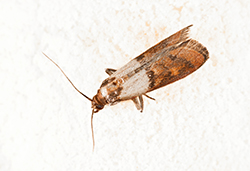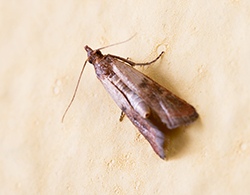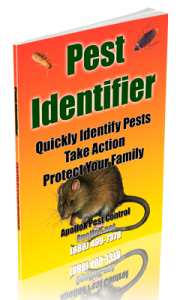Indian Meal Moth Pantry Moths – How do they get into your home?
 If you find pantry moths in your home and in your stored food, it’s not an indication that you did something wrong or are a poor housekeeper. Don’t beat yourself up!
If you find pantry moths in your home and in your stored food, it’s not an indication that you did something wrong or are a poor housekeeper. Don’t beat yourself up!
The indian meal moth most likely hitched a ride into your home in the form of tiny eggs that were present in food you purchased. The eggs later hatched, the larvae consumed the food, grew to maturity, then deposited eggs elsewhere in your home. Now you have an Indian Meal Moth infestation.
Indian Meal Moth Pantry Moths – Foods they infest.
Here are some examples of foods that may be hiding Indian meal moth eggs.
- Powdered milk
- Nuts
- Dried herbs
- Pet food
- Candy
- Pasta
- Dried fruit
- Flours and meals
- Cereals and grains
- Bird seed
As you can see, Indian Meal Moth eggs can be found in a wide variety of foods.
Indian Meal Moth Pantry Moths – Signs of An Infestation:
 Those small moths flying around your kitchen lights at night are likely pantry moths–especially if your doors and windows were closed, so they most possibly came from inside the house.
Those small moths flying around your kitchen lights at night are likely pantry moths–especially if your doors and windows were closed, so they most possibly came from inside the house.
Do you notice small collections of tightly bunched webs along the top of your kitchen cabinets? These may be Indian Meal Moth cocoons.
Then, there are the tiny worm-like larvae. They can grow to over a half inch long and are off-white in color with black or brown heads. You might notice them on walls, close to the ceiling. They’re seeking a place to create a cocoon and turn into an adult egg-laying Indian Meal Moth.
Finally, and most obvious, you open a package of any of the foods on the list above. Inside the package you notice the small larvae, or little clumps of webs, or larvae skins. Now, if the package is not tightly sealed, you can assume the larvae exited and found a place to create a cocoon, transform to an adult, and lay eggs.
Indian Meal Moth Pantry Moths – How to keep them out of your home.
 Any of the types of food listed above that are not stored in air-tight containers or in the refrigerator need to be used up within 3 weeks. In short, don’t store food for longer than 3 weeks in open, exposed containers. This includes pet food (one of the biggest culprits).
Any of the types of food listed above that are not stored in air-tight containers or in the refrigerator need to be used up within 3 weeks. In short, don’t store food for longer than 3 weeks in open, exposed containers. This includes pet food (one of the biggest culprits).
In fact, even food stored in a sealed container for long periods of time can end up with little critters. We once discovered little things crawling about in a completely sealed, unopened plastic canister of protein powder purchased over a year ago and forgotten in the back of a cupboard.
Never keep food past its expiration date. It’s just not worth it.
Indian Meal Moth Pantry Moths – How to eradicate an infestation.
The fact that you’re reading this article may indicate that you already have an Indian Meal Moth infestation and just want to know how to get rid of the moths. Here are some ideas:
Immediately dispose of any food you think might contain Indian Meal Moth eggs or larvae. If you bought two packages of the same type of food on the same day from the same grocer and find one is infested, it might be wise to dispose of both. Don’t take chances.
Empty, and thoroughly clean every cupboard where you store food. Vacuum them, wash them down, and throw away the vacuum bag–outside of the house.
Empty your kitchen garbage container and thoroughly scrub it down.
Wipe down everything with white vinegar (add a few drops of essential oil like peppermint, citronella, eucalyptus or tea tree). You can also place bay leaves on your cupboard shelves and in flour and grain containers. This repels moths.
Continue to monitor your home for the presence of pantry moths and follow the simple preventative measures in the previous section.
Indian Meal Moth Pantry Moths – Want help?
Wouldn’t be great to walk into your home and know there are no pantry moths – and you didn’t need to lift a finger?
We’ll take care of the entire problem FOR you, and even inspect your home for the presence of other pests.












Recent Comments